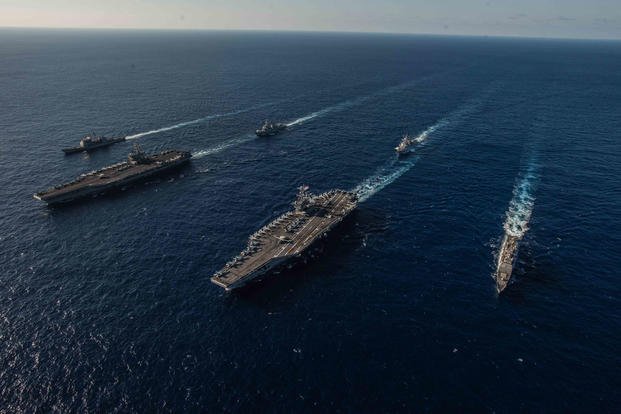The Hong Kong port call of the aircraft carrier Ronald Reagan and two ships from its battle group came ahead of expected meetings this weekend between U.S. President Donald Trump and Chinese President Xi Jinping on the sidelines of an economic summit in Argentina.
China approved the visit by the Reagan to the Asian financial hub two months after denying a scheduled port call to Hong Kong for the amphibious assault ship Wasp amid rising tensions between the two powers over China's military buildup and continuing disputes over trade and tariffs.
The arrival of the Japan-based Reagan, the only forward-deployed carrier out of the 11 in the U.S. fleet; the Ticonderoga-class cruiser Chancellorsville; and the guided-missile destroyer Curtis D. Wilbur in Hong Kong last Wednesday immediately followed on their participation in warfare drills in the Philippine Sea with the carrier John C. Stennis and its battle group.
The visit also came two days after two B-52H Stratofortress bombers out of Andersen Air Force Base in Guam flew over the South China Sea as part of the U.S. Indo-Pacific Command's Continuous Bomber Presence operations, U.S. Pacific Air Forces said in a statement.
"This recent mission is consistent with international law and United States' long-standing commitment to a free and open Indo-Pacific," it said.
In a statement on the Reagan's visit, Rear Adm. Karl Thomas, commander of Carrier Strike Group 5, said, "Hong Kong is always an incredible port visit and I'm glad that the officers and Sailors of Carrier Strike Group 5 will have the chance to enjoy the culture, vitality and diversity of this great city. … The abundant growth and prosperity that surrounds us in Hong Kong is what the United States 7th Fleet seeks to preserve for all nations in this important region."
In a news conference aboard the Reagan last Wednesday, Thomas also commented on the near collision in September of a Chinese Luyang-class destroyer and the guided-missile destroyer Decatur, which was conducting a freedom of navigation exercise in the South China Sea.
"[The] vast majority of our interactions out there at sea are very professional," he said. "That was a rare, unusual occurrence. … In that particular case, the [Chinese] ship made some aggressive, continuing aggressive maneuvers, and our ship warned them and had to maneuver to prevent a collision. It was unfortunate, and I'd like to see that not happen again."
The Navy said in a statement that the more than 5,000 sailors and Marines aboard the three ships were being allowed to go ashore to "to explore Hong Kong and interact with local citizens through sporting competitions, community relations projects, and tours."
The Reagan's visit came as Xi is preparing to depart for a week-long tour that will take him to Spain, Portugal, and Panama, before heading to Argentina for the G20 economic summit this weekend.
The presence of the carrier and its support ships in Hong Kong also came as China's official news agency Xinhua signaled that Xi could be open to easing tensions with Trump in their expected meetings on the sidelines of the G20 summit.
Xinhua quoted Tao Wenzhao, a senior research fellow at the Institute of American Studies at the Chinese Academy of Social Sciences, as saying that the Trump-Xi meeting "should bring the positive energy of the two sides into full play, while keeping the negative elements in control."
However, Xi showed no signs earlier this month of backing down on China's long-term disputes with the U.S. in two tense meetings with Vice President Mike Pence.
Xi criticized what he viewed as U.S. unilateralism and protectionism.
"History has shown that confrontation, whether in the form of a cold war, a hot war or a trade war, produces no winner," he said in a speech to the Asia-Pacific Economic Cooperation summit in Papua New Guinea.
Pence, who attended the summit and met with Xi, said that China has taken advantage of the U.S, for "many, many" years.
"The U.S. will not change course until China changes its ways," he said.
-- Richard Sisk can be reached at Richard.Sisk@Military.com.












